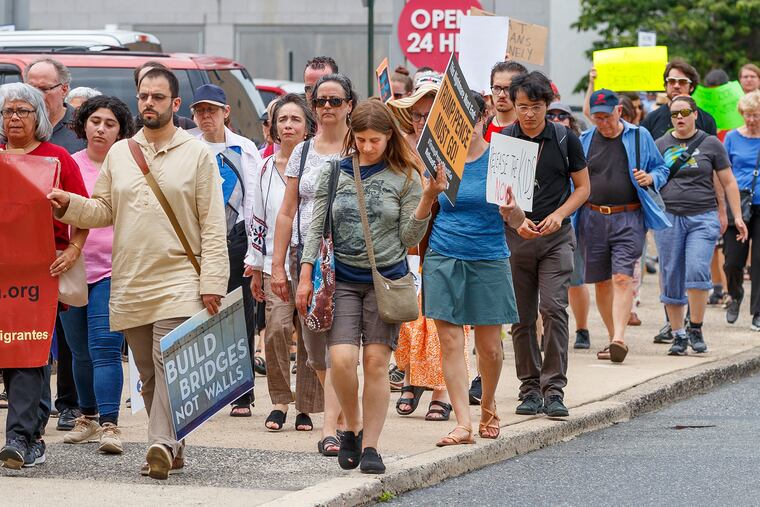When Trump’s cruel immigration policies come for our families and friends, we can’t afford to be allies in theory | Helen Ubiñas
A lot has been said about how the unthinkable has become routine, how every day the unacceptable becomes acceptable. Do not accept any of it.

I felt the blood drain from my body this weekend when the train conductor instructed me and the man across from me not to let anyone take our seats in the Amtrak cafe car as we prepared to pull into Philadelphia.
“We have an unaccompanied minor coming on,” he said.
“Somebody’s kid —," he followed.
I blame the recent news cycle and President Donald Trump’s ramped-up racism against immigrants of color, because I immediately assumed that we were transporting a migrant child away from family. I didn’t have a clue what I could do or should do next.
I panicked, furiously turning to Google. What do allies do in situations like this?
How had I not realized how unprepared I was, even as Trump tweeted of his intent to begin deportation raids in 10 cities — a promise he hasn’t fulfilled, but most likely will soon.
I wanted to at least tell the child that I saw him or her, and that I wanted to help. I searched for some business cards, but I’d just been hiking and had only a backpack full of dirty clothes. I ripped off a piece of the paper bag holding souvenirs, scribbled my name and number with a borrowed pen, and felt every bit the moron when I walked off the train to see a boy being dropped off by a relative as he excitedly set off on a solo adventure.
Even as I breathed a sigh of relief, I couldn’t shake the feeling that many of us have had the luxury of considering this issue only in theory as it inches uncomfortably closer.
On Monday, Prudence Powell, an office manager at Pennsylvania Immigration and Citizenship Coalition, a Philadelphia nonprofit working to advance immigrant rights, talked to me on the sidewalk outside the Center City office of U.S. Immigration and Customs Enforcement (ICE).
She had just spoken at a protest where more than 100 people vowed they would fight the “violent, racist government’s attacks” on immigrants. So had Miguel Andrade, the communications manager for the immigrant advocacy group Juntos.
“It is fair to feel it’s coming closer to home,” Andrade later told me, noting Trump’s continued threats toward sanctuary cities like Philadelphia.
They were kind when I relayed the story of my bumbling rescue attempt. The reality, they told me, is that by the time a child is in custody, there are limits to what an ally can do. But there are a few things: Remind the child that he or she has rights, which include not saying or signing anything without a lawyer. Ask the children’s names, try to find out where they are going, and then reach out to organizations that might be able to help.
There’s also a lot more that we can do before this administration comes for our families, our neighbors, and friends, people who are American in every way but a piece of paper. And if that sounds hysterical, consider the recent study that found many county and municipal governments in Pennsylvania use local resources to actively assist federal immigration agents.
Want to be an effective ally? First, identify the organizations doing the work. Increasingly, local and national organizations are offering online tool kits and webinars for people who want to know how to help. Seek them out. Study them, and use them.
We should be pushing for legislation to protect immigrants. We should be taking to the streets against this administration’s flat-out torture of children. But we also need to financially support organizations that are doing the work, including New Sanctuary Movement of Philadelphia, which has a Community Fund for Bond and Legal Support to help immigrants get a family member out of detention or pay for legal fees.
A lot has been said about how the unthinkable has become routine, how every day the unacceptable becomes acceptable. Do not accept any of it. Our humanity, and people’s lives, are at stake.
When Powell spoke to the crowd, I noticed a few tattoos she later told me she got to mark her journey as an undocumented 12-year-old when she moved from Jamaica.
One in particular should speak to us all: “Refuse to sink.”